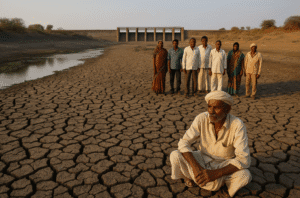Krishna River Water Release: Maharashtra’s Shocking Refusal Leaves 13 Districts Parched – Urgent Crisis!
The Krishna River crisis in Karnataka’s northern districts has reached critical levels as the river dries up earlier than ever due to rising temperatures and erratic climate patterns. Farmers in Bagalkot, Vijayapura, and Yadgir are watching their crops wither, with drinking water now supplied only once every two weeks by tankers. Karnataka’s appeal to Maharashtra for 3 TMCft of emergency water remains unanswered, worsening tensions and leaving 13 districts in a precarious state. Critics argue that bureaucratic delays and reliance on formal requests are failing to meet the urgency of the crisis. A 2015 water-sharing pact between the two states remains largely unfulfilled due to infrastructure delays and soaring costs.
In contrast, regions supported by the Hipparagi barrage still enjoy stable water access, proving the value of strategic planning. Experts warn that without expedited action, such as completing stalled pipeline projects and strengthening cooperative agreements, the region will continue to face recurring water insecurity. The crisis calls for immediate, collaborative, and climate-resilient solutions to protect vulnerable farming communities.

Krishna River Water Release: Maharashtra’s Shocking Refusal Leaves 13 Districts Parched – Urgent Crisis!
As temperatures soar to unprecedented levels, communities along the Krishna River in Karnataka’s northern districts face an escalating water crisis. The river, a critical lifeline for irrigation and drinking water, has dried up months earlier than usual, leaving farmers in Bagalkot, Vijayapura, and Yadagiri districts desperate for relief. With Maharashtra yet to respond to Karnataka’s plea for emergency water releases, tensions over inter-state resource sharing are mounting.
Early Drought, Deepening Distress
Traditionally, the Krishna River begins to recede by May, but this year, parched riverbeds emerged in April—a grim indicator of climate shifts. “Our crops have withered, and livelihoods are at risk,” shared Siddarayappa Koravi, a farmer from Yadgir. The Kalyan Karnataka region, already prone to scanty rainfall, relies heavily on the river. While drinking water is currently supplied via tankers every fortnight, villagers fear shortages if the situation worsens.
Political Appeals and Delayed Responses
On April 1, Karnataka Chief Minister Siddaramaiah urgently requested Maharashtra’s CM Devendra Fadnavis to release 3 TMCft (thousand million cubic feet) of water from the Koyana and Varana reservoirs. However, Maharashtra’s silence has left 13 districts in Kittur and Kalyan Karnataka grappling with dual crises: parched farms and dwindling drinking water.
Critics argue that Karnataka’s reliance on formal appeals is insufficient. “Letters won’t solve this. We need a bipartisan delegation to pressure Maharashtra,” asserted Siddagouda Modagi of the Karnataka Krushika Samaj, highlighting growing frustration over bureaucratic delays.
A Fragile Water-Sharing Pact
The stalemate underscores deeper challenges in inter-state water management. In 2015, Karnataka and Maharashtra inked a landmark pact: Karnataka would release 3 TMCft from the Tubachi-Babaleshwar dam to Maharashtra’s Jat taluk, while Maharashtra would reciprocate from its reservoirs. However, a proposed 30-km pipeline to facilitate this exchange remains stalled, with costs ballooning from ₹300 crore in 2016 to nearly ₹1,000 crore today.
“Infrastructure delays and rising costs have crippled the agreement’s implementation,” noted irrigation expert Ashok Chandargi. Without these pipelines, sustainable water sharing remains elusive.
Contrasting Realities: Barrages Offer Respite
Amid the crisis, areas like Athani, Chikkodi, and Raibag taluks—served by the Hipparagi barrage—report stable water access for both agriculture and households. This disparity highlights how strategic infrastructure can mitigate climate impacts, even as neighboring regions falter.
The Path Forward
As temperatures climb, the urgency for cooperation intensifies. Farmers like Koravi face an uncertain wait, their annual agricultural cycle disrupted. Karnataka’s PWD Minister Satish Jarkiholi has urged swift action, but the clock is ticking.
The crisis underscores a pressing need for long-term solutions: modernizing water-sharing agreements, accelerating infrastructure projects, and fostering inter-state collaboration. With climate patterns growing erratic, proactive measures—not just reactive appeals—are essential to safeguarding vulnerable communities.
For now, villagers along the Krishna cling to hope, their lives suspended between the scorching heat and the promise of relief from across the border.
You must be logged in to post a comment.